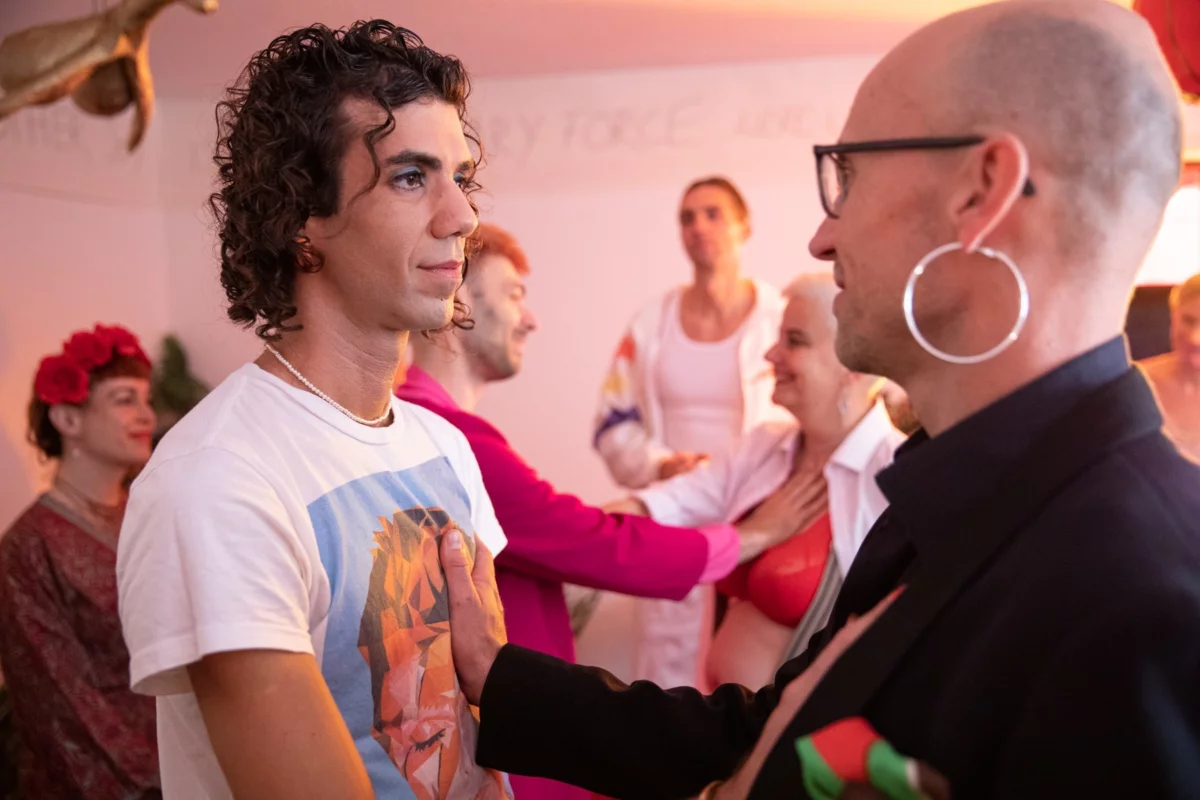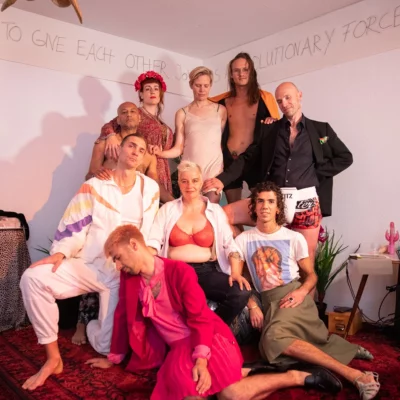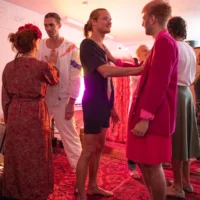"We need an aesthetic of touch"
By Elena Philipp
With "Queens," artist and director Sibylle Peters has created a club for heterosexual women's pleasure that breaks with all the patriarchal norms.
Living in a non-patriarchal society where women can live out their sexual desires without feeling ashamed and without having to fear transgressions or sexual violence. What would that be like? With "Queens. The Heteraclub" Sibylle Peters has created the performative environment to try it out. In 2020, the temporary feminist nightclub opened for a few days next to the Golden Pudel Club in St. Pauli, Hamburg. The red-light district usually offers sex to white, heterosexual men. For women, there’s nothing except some bars, concerts, a few food trucks. "The first Heteraclub introduced a certain gender equality there," Sibylle Peters says, describing the thinking behind her project. Female pleasure first!
Sex in the sense of penetration for sale is not the idea behind "Queens" – the Heteraclub is clearly located within the art context, even if it appears to oscillate between performance and sex work. But doesn't sex work also have a strong performative component? Sibylle Peters believes that this should be more clearly recognized.
The artist, director, and university lecturer carried out extensive research into heterosexuality for “Queens.” Half of all women, according to one of the shocking statistics, have experienced sexual assault. Their attitudes toward their sexuality also differ from those of heterosexual men: "There are studies on the fact that heterosexual women are far more socialized to be monogamous than heterosexual men. Love means devotion, being someone's property," Peters explains. "That's a point we always negotiate with the visitors to the club, too: Am I even allowed to go there if I'm in a monogamous relationship?" From Peters' point of view, the answer is yes. Female sexuality has been hidden and demonized for long enough. It’s time for that to change. Which is what the Heteraclub wants to help achieve.
After the first Heteraclub took place just before the first coronavirus lockdown, "Queens" was able to open its doors again in June 2022 at the Impulse Festival in Mülheim, thanks to a grant from the NEUSTART-KULTUR program #TakeHeart. The two editions were very different, Sibylle Peters tells us, "At St. Pauli, sex work was quite present, there we had to keep the performers' boundaries in that direction. In Mülheim, it was the boundary to the therapy room, which we discussed critically in the team."
"Queens" had already attracted fans during its first iteration. "Some traveled from Hamburg," performer Nilsipilsi, who was already part of the show at St. Pauli, says about the Mülheim edition. The impact of "Queens" is made evident in the love letters to the club that the team publishes on the website: Thank you for the "place of discovery & curiosity & experience," reads one of the handwritten notes to the "wonderful people." "I'm quite enchanted by the personalities that the ladies let out here," writes another visitor. "I perceive so much interest and appreciation on the part of the space and the people in it. I wish to have the Heteraclub for evvvvvvvver."
Sibylle Peters has also been moved by “Queens.” "I've done a lot of performances that were about social issues and about upending common perceptions. But I don't think it's ever been as intense as the Heteraclub. It's amazing what experiences people have had." She adds, "There's also great sadness in seeing what is missing otherwise."
At “Queens,” the focus is on the female visitors. A group of six of them each spend two hours at the Heteraclub along with the six Hetera performers and the two pimps, Sibylle Peters and her colleague Charlotte Pfeifer. Most of the time they all stay in the salon, where they get to know each other, Peters introduces the performances, asks the guests – or queens – about their wishes and needs and then matches them with the performers. Then each queen departs for one of the small private rooms with a Hetera performer for a one-on-one performance that lasts half an hour. The aim? To cause pleasure. "The word has many connotations, including joy, fun, intimacy, it all plays into it." And desire, fulfilling women's needs are at the top of the list. Performer Nils Findus says, "The club is about the woman's desire. My own desire has to be scaled back."
 © Robin Junicke
© Robin Junicke
Nils, who works as a dancer and acrobat after studying fine arts, has developed an audio guide with a friend. He stands in front of the visitor with a blindfold on while Joelle's voice introduces him, tells of their relationship and invites you to look closely at him, touch him, or undress him. "I don't see the queen, I just hear and smell her at first," Nils says. For him, this helps to establish contact without prejudice, so he can meet each visitor with an open mind. "What happens is always very different. That's the exciting thing: Even though the framework is the same, every experience is different," the performer says. "I had someone very cautious there, where I had to be very sensitive and where there were tears. And I had a beautiful, respectful encounter where there was a very big age difference." For Nils, the experience is as intense as it is for the visitors: "I'm non-stop in the moment, there's something very meditative about it." And he sees potential for change in "Queens:" "What makes it very special is that within the group dynamics we understand much more about the complexity of emotionality, the role of women in society, about patriarchy, and about sex and desire in the gender spectrum."
Queens is a safe space in two ways: it excludes the patriarchy – only female visitors are admitted – and whatever intimacy happens is treated with caution in the encounter and subject to a clear understanding of consent. "We're also very safe in the practical sense: there are gloves, lick cloths, and toy covers." Clear rules that allow everyone to maintain their boundaries is the premise of "Queens": "Anything that requires an erection or implies ejaculation does not take place here, there is no penis-in-vagina penetration. In that way, we protect everyone involved," Peters emphasizes. "But some performances invite masturbation; orgasms are possible."
For Sibylle Peters, "Queens" is "a heteratopia" – in the style of Foucault, a place where the usual social norms only apply to a limited extent, a place that functions according to its own rules. What does the utopian moment of "Queens" consist of for her? "During the coronavirus pandemic, it became clear that we need an aesthetic of touch because touch is so unfairly distributed. Some people are not touched at all. That is detrimental to health, not to mention the emotional consequences," explains Peters, who also sees the arts as having a responsibility here: "We need an aesthetic of touch. I find it incomprehensible that theater wants to touch people, but only in the heart. The mandate of state-supported art is also to create places where touch happens, for people who don't have children, who aren't in relationships, or who can't afford retreats." So that everyone can live in a society where caring for each other is the normal state of things. To turn Elisabeth von Thadden's oft-quoted book title about the "touchless society" on its head: “Queens” is a model project for a high-touch society.
From the funding to the rehearsal room and onto the stage – the cultural journalists Georg Kasch and Elena Philipp visit projects funded as part of #TakeHeart of the Fonds Darstellende Künste.

